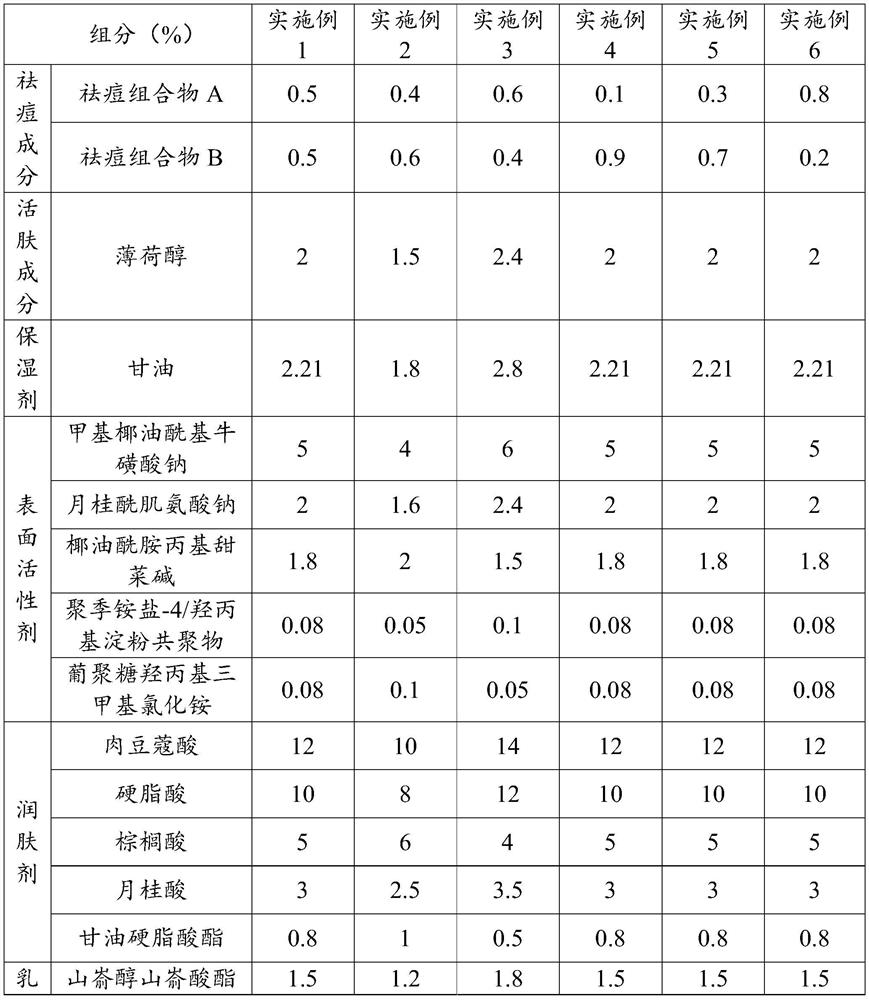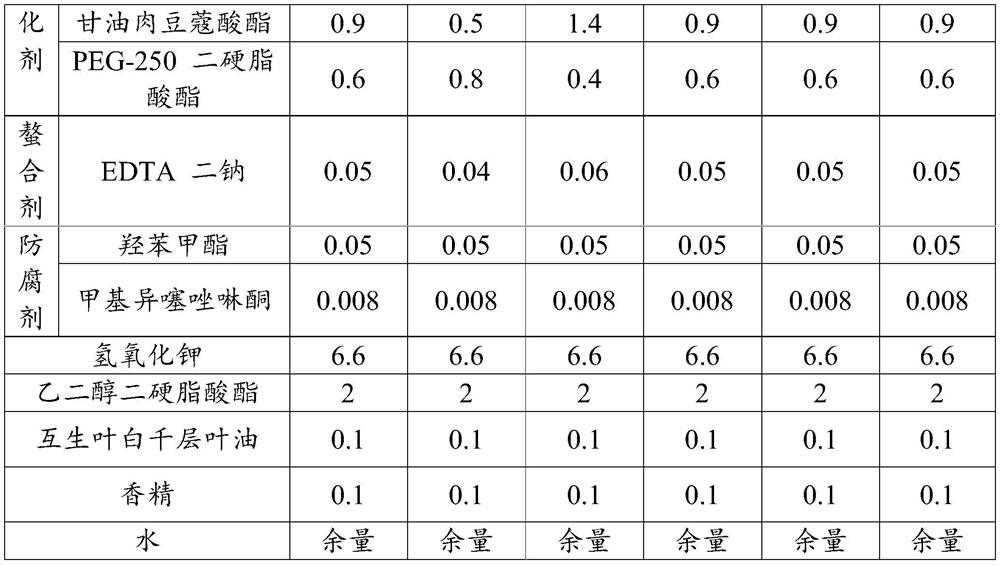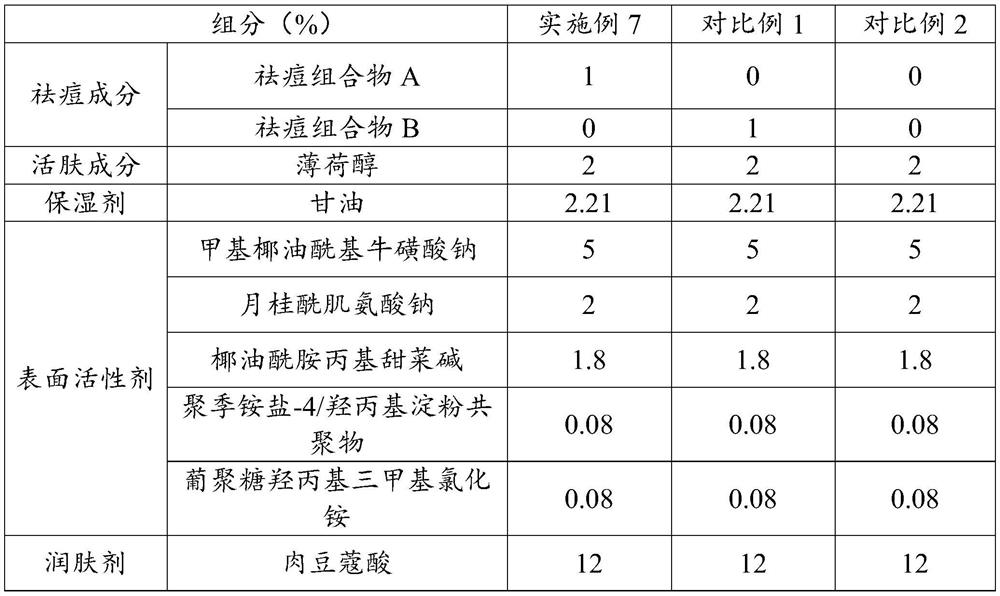An acne-removing facial cleanser
A facial cleanser and anti-acne technology, which can be used in pharmaceutical formulations, cosmetic preparations, cosmetics, etc., and can solve problems such as difficulty in treatment and affecting appearance
- Summary
- Abstract
- Description
- Claims
- Application Information
AI Technical Summary
Problems solved by technology
Method used
Image
Examples
Embodiment 1~7
[0031] Examples 1-7 are examples of the acne-removing facial cleanser of the present invention, and the formulas of the acne-removing facial cleanser described in Examples 1-6 are shown in Table 1. The formula of acne-removing facial cleanser described in Example 7 is shown in Table 2. In Examples 1-7, the parts by weight of each component in the acne-removing composition A are: 15 parts of Salvia root extract, 3 parts of clove flower bud extract, 2 parts of Scutellaria baicalensis root extract, 2 parts of Angelica root extract, licorice 1 part of root extract and 1 part of Centella asiatica extract; the parts by weight of the components in the acne-removing composition B are: 3 parts of Hedyotis diffusa extract, 3 parts of Honeysuckle extract and 1 part of Acacia japonica seed extract share.
[0032] The preparation method of the acne-removing facial cleanser described in Examples 1 to 7 comprises the following steps:
[0033] S1, clean the production pot first, and disinfe...
Embodiment 8
[0049] Product Safety Evaluation (Human Skin Patch Test)
[0050] 1. Test product: the acne-removing facial cleanser prepared in Examples 1-7 and Comparative Examples 1 and 2
[0051] Number of subjects: 90, female
[0052] Age: between 12 and 30 years old
[0053] Health status: The subjects have healthy skin, no history of allergies to skin diseases, and meet the voluntary selection criteria for subjects.
[0054] Grouping: 9 groups, 10 people in each group, with an average age of 25±2 years old.
[0055] 2. Patch method: select a qualified patch tester, drop about 0.020g ~ 0.025g of the test substance into the patch tester in a closed patch test method, and stick the special tape for external use on the back of the subject, 24 After 1 hour, the test substance was removed, and the skin reaction was observed at 0.5, 6, 12, 24, and 48 hours after removal, and the results were recorded according to the skin reaction grading standard in the "Hygienic Standards for Cosmetics"....
Embodiment 9
[0058] Bacteriostatic effect test
[0059] 1. Test materials
[0060] 1. Test strain: Propionibacterium acnes (ATCC6919).
[0061] 2. Test samples: according to S1, S2, S3, S4, S5, S6, S7, D1, D2 samples, store at 4°C for later use, among which S1, S2, S3, S4, S5, S6, S7, D1, D2 correspond to The proportioning of the anti-acne ingredients in Examples 1-7 and Comparative Examples 1 and 2.
[0062] 3. Culture medium: Propionibacterium acnes medium, adjust the pH to 6.6-7.0. Add agar 15g / L to the solid medium.
[0063] 2. Test method
[0064] 1. Preparation and inoculation of the bacterial suspension: Take 0.1 mL of the frozen preserved bacterial suspension and put it in 5 mL of Propionibacterium acnes liquid medium, and culture it under anaerobic conditions at 37°C for 2 days to obtain the experimental bacterial suspension.
[0065] 2. Preparation of medicinal solution: Dilute S1, S2, S3, S4, S5, S6, S7, D1, and D2 with normal saline to a test concentration of 0.1%, and the...
PUM
 Login to View More
Login to View More Abstract
Description
Claims
Application Information
 Login to View More
Login to View More - R&D
- Intellectual Property
- Life Sciences
- Materials
- Tech Scout
- Unparalleled Data Quality
- Higher Quality Content
- 60% Fewer Hallucinations
Browse by: Latest US Patents, China's latest patents, Technical Efficacy Thesaurus, Application Domain, Technology Topic, Popular Technical Reports.
© 2025 PatSnap. All rights reserved.Legal|Privacy policy|Modern Slavery Act Transparency Statement|Sitemap|About US| Contact US: help@patsnap.com



